Fleurs du Mal Magazine


Or see the index
One of Library Journal’s “Thirty Amazing Poetry Titles for Spring 2014,” The Keys to the Jail asks the question of who is to blame for all we’ve lost, calling us to reexamine the harsh words of failed love, the aging of a once-beautiful body, even our own voracious desires.
 With daring leaps and unflinching observations, these richly textured lyrics travel from Montana’s great wildernesses to the ocean-fogged streets of San Francisco as they search out the heart that’s lost its way.
With daring leaps and unflinching observations, these richly textured lyrics travel from Montana’s great wildernesses to the ocean-fogged streets of San Francisco as they search out the heart that’s lost its way.
The Keys to the Jail asks the question of who is to blame for all we’ve lost, calling us to reexamine the harsh words of failed love, the aging of a once-beautiful body, even our own voracious desires.
Keetje Kuipers is a poet of daring leaps and unflinching observations, whose richly textured lyrics travel from Montana’s great wildernesses to the ocean-fogged streets of San Francisco as they search out the heart that’s lost its way.
(. . .) Shirtless
in the phosphorescent gloom of streetlamps,
they lie suspended. This is my one good
life—watching the exchange of embraces,
counting the faces assembled outside
the ice-cream shop, sweet tinge of urine by
the bridge above the tracks, broken bike lock
of the gay couple’s hands, desperate clapping
of dark pigeons—who will take it from me?
(. . .)
Dolores Park (fragment)
A former Wallace Stegner Fellow in Poetry, Keetje Kuipers’s debut collection, Beautiful in the Mouth, won the A. Poulin, Jr. Poetry Prize. She has been the Margery Davis Boyden Wilderness Writing Resident, and is currently an assistant professor at Auburn University.
Keetje Kuipers is a native of the Northwest. She earned her B.A. at Swarthmore College and her M.F.A. at the University of Oregon. She has been the recipient of a number of fellowships, including those from the Vermont Studio Center, Squaw Valley Community of Writers, and Oregon Literary Arts.
In 2007 Keetje completed her tenure as the Margery Davis Boyden Wilderness Writing Resident, which provided her with seven months of solitude in Oregon’s Rogue River Valley. She used her time there to complete work on her book, Beautiful in the Mouth, which was awarded the 2009 A. Poulin, Jr. Poetry Prize and was published in 2010 by BOA Editions. It contains poems previously published in Prairie Schooner, West Branch, Willow Springs, and AGNI, among others. You can also listen to her read her work—which has been nominated seven years in a row for the Pushcart Prize—at the online audio archive From the Fishouse. Keetje’s second book, The Keys to the Jail, is forthcoming from BOA Editions in the spring of 2014, and contains poems previously published in American Poetry Review, Jubilat, and the Indiana Review.
Keetje Kuipers was a Wallace Stegner Fellow at Stanford University from 2009-2011, and she was the Emerging Writing Lecturer at Gettysburg College from 2011-2012. Currently she is an Assistant Professor at Auburn University where she lives with her family and their dog, Bishop (named after Elizabeth, of course).
Keetje Kuipers
Title: The Keys to the Jail
Poems
Publisher: BOA Editions Ltd.
2014
Language: English
Paperback
96 pages
ISBN-10: 1938160266
ISBN-13: 978-1938160264
$17.00
• fleursdumal.nl magazine
More in: #Modern Poetry Archive, - Book News, - Bookstores, Archive K-L, Archive K-L, Kuipers, Keetje
De poëzie van Ruth Lasters is aards, wil aards zijn.
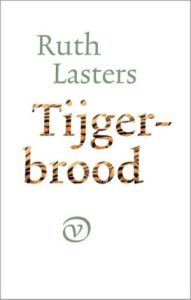 In een weloverwogen syntaxis, met een voorkeur voor het onverwachte perspectief en een warm hart voor de zwakkeren, componeert ze versbeelden die afwijkend zijn en energiek, muzikaal en beeldend.
In een weloverwogen syntaxis, met een voorkeur voor het onverwachte perspectief en een warm hart voor de zwakkeren, componeert ze versbeelden die afwijkend zijn en energiek, muzikaal en beeldend.
Tijgerbrood gaat over het verlangen om voor altijd toevlucht te kunnen zoeken, op te lossen in pure vorm, in woordenloosheid. De auteur is haar vroegere compartimenten kwijt.
De dichter, leerkracht, kindervrije vrouw, partner, pacifist, klimaattobber en kunstliefhebber werden samengekneed tot één wezen dat haar hoop, bekommernissen en angsten meer en meer durft te erkennen als die van iedereen.
Als brood leven is, zoals men zegt, is tijgerbrood een leven in camouflagevel om als observator ongehinderd de stem te kunnen opvangen van de hele maatschappij.
Auteur(s) : Ruth Lasters
Uitgeverij: Uitgeverij G.A. Van Oorschot
ISBN: 9789028231030
Taal: Nederlands
Uitvoering: Paperback
Aantal pagina’s: 80
Verschijningsdatum: februari 2023
Afmetingen: 220 x 140 x 10 mm.
Paperback 19.50
• fleursdumal.nl magazine
More in: #Editors Choice Archiv, - Book News, - Bookstores, Archive K-L, Archive K-L

The City of Sleep
Over the edge of the purple down,
Where the single lamplight gleams,
Know ye the road to the Merciful Town
That is hard by the Sea of Dreams –
Where the poor may lay their wrongs away,
And the sick may forget to weep?
But we – pity us! Oh, pity us!
We wakeful; ah, pity us! –
We must go back with Policeman Day –
Back from the City of Sleep!
Weary they turn from the scroll and crown,
Fetter and prayer and plough –
They that go up to the Merciful Town,
For her gates are closing now.
It is their right in the Baths of Night
Body and soul to steep,
But we – pity us! ah, pity us!
We wakeful; oh, pity us! –
We must go back with Policeman Day –
Back from the City of Sleep!
Over the edge of the purple down,
Ere the tender dreams begin,
Look – we may look – at the Merciful Town,
But we may not enter in!
Outcasts all, from her guarded wall
Back to our watch we creep:
We – pity us! ah, pity us!
We wakeful; ah, pity us! –
We that go back with Policeman Day –
Back from the City of Sleep!
Rudyard Kipling
(1865 – 1936)
The City of Sleep
• fleursdumal.nl magazine
More in: Archive K-L, Archive K-L, Kipling, Rudyard
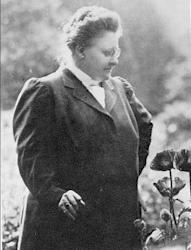
The Weather-Cock Points South
I put your leaves aside,
One by one:
The stiff, broad outer leaves;
The smaller ones,
Pleasant to touch, veined with purple;
The glazed inner leaves.
One by one
I parted you from your leaves,
Until you stood up like a white flower
Swaying slightly in the evening wind.
White flower,
Flower of wax, of jade, of unstreaked agate;
Flower with surfaces of ice,
With shadows faintly crimson.
Where in all the garden is there such a flower?
The stars crowd through the lilac leaves
To look at you.
The low moon brightens you with silver.
The bud is more than the calyx.
There is nothing to equal a white bud,
Of no colour, and of all,
Burnished by moonlight,
Thrust upon by a softly-winging wind.
Amy Lowell
(1874-1925)
The Weather-Cock Points South
• fleursdumal.nl magazine
More in: Archive K-L, Archive K-L, Lowell, Amy

If—
If you can keep your head when all about you
Are losing theirs and blaming it on you,
If you can trust yourself when all men doubt you,
But make allowance for their doubting too;
If you can wait and not be tired by waiting,
Or being lied about, don’t deal in lies,
Or being hated, don’t give way to hating,
And yet don’t look too good, nor talk too wise:
If you can dream—and not make dreams your master;
If you can think—and not make thoughts your aim;
If you can meet with Triumph and Disaster
And treat those two impostors just the same;
If you can bear to hear the truth you’ve spoken
Twisted by knaves to make a trap for fools,
Or watch the things you gave your life to, broken,
And stoop and build ’em up with worn-out tools:
If you can make one heap of all your winnings
And risk it on one turn of pitch-and-toss,
And lose, and start again at your beginnings
And never breathe a word about your loss;
If you can force your heart and nerve and sinew
To serve your turn long after they are gone,
And so hold on when there is nothing in you
Except the Will which says to them: ‘Hold on!’
If you can talk with crowds and keep your virtue,
Or walk with Kings—nor lose the common touch,
If neither foes nor loving friends can hurt you,
If all men count with you, but none too much;
If you can fill the unforgiving minute
With sixty seconds’ worth of distance run,
Yours is the Earth and everything that’s in it,
And—which is more—you’ll be a Man, my son!
Rudyard Kipling
(1865 – 1936)
If
• fleursdumal.nl magazine
More in: Archive K-L, Archive K-L, Kipling, Rudyard
The only book of poetry to date devoted to the Rwanda genocide and published in this country, this is a work of nonfictional poetry, a cousin in genre to the nonfictional novel.
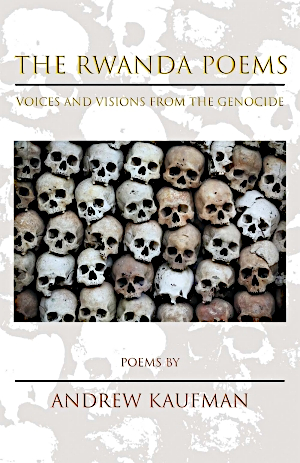 It is based not only on the poet’s observations and encounters during months spent in post-genocide Rwanda, but on his numerous extensive interviews with survivors, all of whom lost most if not all of their families, and with convicted genocide perpetrators, conducted in prisons.
It is based not only on the poet’s observations and encounters during months spent in post-genocide Rwanda, but on his numerous extensive interviews with survivors, all of whom lost most if not all of their families, and with convicted genocide perpetrators, conducted in prisons.
The result is a startling book of poems that by turns is unthinkably horrifying, heartbreaking, and enraging, yet which at times breaks unexpectedly into stunning revelatory moments of grace.
As a poetry of witness this book reveals what it is like to carry on with daily life in a society where nearly every adult male is either a genocide survivor or perpetrator, almost every woman either a survivor or the wife of a perpetrator, and where nearly every child at the time of the genocide witnessed multiple killings, often of immediate family members.
Ranging from free verse to stanzaic forms, this book by an NEA-award-winning poet uses tools and methods of poetry to distil each of its many varied voices to its essence, allowing those who are heard in these poems to speak for themselves, often in juxtapositions that lend the book the structure and tension of a drama. Considered more broadly, The Rwanda Poems is a book about the extremities of evil that the human psyche is capable of enduring and inflicting, and the resulting psychic costs to survivors and perpetrators.
Andrew Kaufman‘s books include Earth’s Ends, winner of the Pearl Poetry Prize, The Cinnamon Bay Sonnets, winner of the Center for Book Arts book award, Both Sides of the Niger (Spuyten Duyvil Press), and the COMPLETE CINNAMON BAY SONNETS (Rain Mountain Press). The time he spent in Rwanda was made possible in part by an NEA grant. He has taught literature and writing at a number of colleges and universities, and resides in New York City.
The Rwanda Poems
Voices and Visions from the Genocide
by Andrew Kaufman
Language: English
Publisher: NYQ Books
10 Mar. 2023
Product Number:9781630450816
ISBN-10: 1630450812
ISBN-13: 978-1630450816
Pages:110
Paperback
£12.13
• fleursdumal.nl magazine
More in: #Editors Choice Archiv, - Book News, - Bookstores, Archive K-L, Archive K-L
When poet Amy Key was growing up, she looked forward to a life shaped by romance, fuelled by desire, longing and the conventional markers of success that come when you share a life with another person.
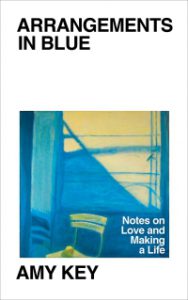 But that didn’t happen for her. Now in her forties, she sets out to explore the realities of a life lived in the absence of romantic love.
But that didn’t happen for her. Now in her forties, she sets out to explore the realities of a life lived in the absence of romantic love.
Using Joni Mitchell‘s seminal album Blue – an album that shaped Key’s expectations of love – as her guide, she examines the unexpected life she has created for herself.
Building a home, travelling alone, choosing whether to be a mother, recognising her own milestones, learning the limits of self-care and the expansive potential of self-friendship, Key uncovers the many forms of connection and care that often go unnoticed.
With profound candour and intimacy, Arrangements in Blue explores the painful feelings we are usually too ashamed to discuss: loneliness, envy, grief and failure.
The result is a singular work – a beautifully-written and essential book about building a life on your own terms, which inspires us to live and love more honestly.
Arrangements in Blue
by Amy Key
Poetry
English
Vintage Publishing
(Ww Norton & Co)
6 April 2023
ISBN: 9781787333895
Hardback
224 pages
Price: 27,99 euro
•fleursdumal.nl magazine
More in: #Editors Choice Archiv, - Book News, - Bookstores, Archive K-L, Archive K-L, Joni Mitchell
In mei 1940 is de dichter Gerrit Kouwenaar (1923-2014) zestien jaar en schrijft hij zijn eerste gedichten.
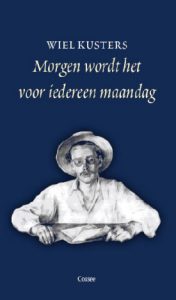 Zes jaar later en een wereldoorlog verder is hij, zonder dat nog te beseffen, op weg om een van de meest invloedrijke Vijftigers te worden.
Zes jaar later en een wereldoorlog verder is hij, zonder dat nog te beseffen, op weg om een van de meest invloedrijke Vijftigers te worden.
De Tweede Wereldoorlog, die grote ontvormer van mens en moraal, heeft hem gemaakt tot de dichter die later liever ‘men’ dan ‘ik’ schreef en die, tot zijn dood in 2014, is uitgegroeid tot een van de grootste Nederlandse dichters van de twintigste eeuw.
In zijn dankwoord bij de uitreiking van de Prijs der Nederlandse Letteren in 1989 in Brussel sprak hij over de jaren 1940-1945 als een ‘leerschool die mij heeft bijgebracht dat woorden lege hulzen zijn als ze niet gevuld worden met je eigen leven en lichaam, je eigen sterfelijkheid.’
Morgen is het voor iedereen maandag belicht op uiterst boeiende wijze de periode van de bezetting en de eerste jaren na de oorlog, wanneer de dichter als kunstredacteur in dienst is van het communistische dagblad De Waarheid. Het verhaal is doorspekt met tal van niet eerder gepubliceerde gedichten, verhaal- en brieffragmenten.
Morgen wordt het voor iedereen maandag
De oorlog van Gerrit Kouwenaar
door Wiel Kusters
Taal: NL
Cossee
Mei 2023
ISBN: 9789464520767
Hardcover
450 pagina’s
€ 39,99
• fleursdumal.nl magazine
More in: - Book News, - Bookstores, Archive K-L, Archive K-L, Gerrit Kouwenaar, Kouwenaar, Gerrit, Wiel Kusters

Die Verscheuchte
Es ist der Tag im Nebel völlig eingehüllt,
Entseelt begegnen alle Welten sich-
Kaum hingezeichnet wie auf einem Schattenbild.
Wie lange war kein Herz zu meinem mild…
Die Welt erkaltete, der Mensch verblich.
Komm bete mit mir – denn Gott tröstet mich.
Wo weilt der Odem, der aus meinem Leben wich?
Ich streife heimatlos zusammen mit dem Wild
Durch bleiche Zeiten träumend – ja ich liebte dich…
Wo soll ich hin, wenn kalt der Nordsturm brüllt?
Die scheuen Tiere aus der Landschaft wagen sich
Und ich vor deine Tür, ein Bündel Wegerich.
Bald haben Tränen alle Himmel weggespült,
An deren Kelchen Dichter ihren Durst gestillt-
Auch du und ich.
Else Lasker-Schüler
(1869 – 1945)
Die Verscheuchte
• fleursdumal.nl magazine
More in: #Editors Choice Archiv, Archive K-L, Archive K-L, Lasker-Schüler, Else
Als voormalig journalist/vertaler Daan Roos een date zoekt op internet, komt hij in de echte wereld Sylvia tegen en is meteen verkocht.
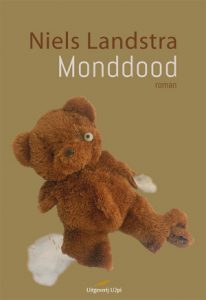 Hij ligt in scheiding met de wispelturige Chantal die haar positie als moeder van twee misbruikt in de echtscheidingszaak. Afwisselend woont hij in een camper en bij Sylvia die aan een progressieve variant van MS lijdt wat haar grilligheid versterkt.
Hij ligt in scheiding met de wispelturige Chantal die haar positie als moeder van twee misbruikt in de echtscheidingszaak. Afwisselend woont hij in een camper en bij Sylvia die aan een progressieve variant van MS lijdt wat haar grilligheid versterkt.
Langzaam raakt hij verstrikt in het oerwoud van hulpverlening en regelgeving waar psychiater, psycholoog, jeugdbegeleiders, rechter, advocaten, opsporingsambtenaren, ziektewet, bijstand, sociale recherche, voedselbank en daklozenopvang hem eerder tegenwerken dan meewerken. De goedbedoelde acties van zijn voormalig werkgever Freek, de bijna bejaarde buurman Mook of Sascha, de schizofrene ex van Sylvia, helpen Daan ook niet echt.
De auteur schept er een genoegen in personages en verwikkelingen met uitbundig creatieve maar passende metaforen aan het papier toe te vertrouwen met beelden die meer oproepen dan de woorden zelf. Monddood is een rauwe en ontroerende roman, waarin de troosteloze absurditeit van het leven besloten ligt en haast schrijnend dichtbij komt in de fysieke en geestelijke aftakeling van het leven.
Monddood
Auteur: Niels Landstra
Roman
Taal: Nederlands
Uitgeverij U2Pi
1 december 2022
Paperback
229 pagina’s
EAN 9789493299429
19,50 euro
• fleursdumal.nl magazine
More in: - Book News, - Bookstores, Archive K-L, Archive K-L, Landstra, Niels, Niels Landstra

Heimweh
Ich kann die Sprache
Dieses kühlen Landes nicht,
Und seinen Schritt nicht gehn.
Auch die Wolken, die vorbeiziehn,
Weiß ich nicht zu deuten.
Die Nacht ist eine Stiefkönigin.
Immer muß ich an die Pharaonenwälder denken
Und küsse die Bilder meiner Sterne.
meine Lippen leuchten schon
Und sprechen Fernes,
Und bin ein buntes Bilderbuch
Auf deinem Schoß.
Aber dein Antlitz spinnt
Einen Schleier aus Weinen.
Meinen schillernden Vögeln
Sind die Korallen ausgestochen,
An den Hecken der Gärten
Versteinern sich ihre weichen Nester.
Wer salbt meine toten Paläste –
Sie trugen die Kronen meiner Väter,
Ihre Gebete versanken im heiligen Fluß.
Else Lasker-Schüler
(1869 – 1945)
Heimweh
• fleursdumal.nl magazine
More in: #Editors Choice Archiv, Archive K-L, Archive K-L, Lasker-Schüler, Else
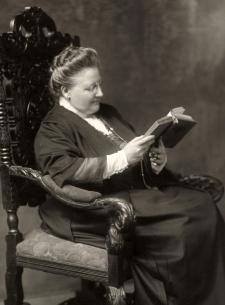
The Exeter Road
Panels of claret and blue which shine
Under the moon like lees of wine.
A coronet done in a golden scroll,
And wheels which blunder and creak as they roll
Through the muddy ruts of a moorland track.
They daren’t look back!
They are whipping and cursing the horses. Lord!
What brutes men are when they think they’re scored.
Behind, my bay gelding gallops with me,
In a steaming sweat, it is fine to see
That coach, all claret, and gold, and blue,
Hop about and slue.
They are scared half out of their wits, poor souls.
For my lord has a casket full of rolls
Of minted sovereigns, and silver bars.
I laugh to think how he’ll show his scars
In London to-morrow. He whines with rage
In his varnished cage.
My lady has shoved her rings over her toes.
‘Tis an ancient trick every night-rider knows.
But I shall relieve her of them yet,
When I see she limps in the minuet
I must beg to celebrate this night,
And the green moonlight.
There’s nothing to hurry about, the plain
Is hours long, and the mud’s a strain.
My gelding’s uncommonly strong in the loins,
In half an hour I’ll bag the coins.
‘Tis a clear, sweet night on the turn of Spring.
The chase is the thing!
How the coach flashes and wobbles, the moon
Dripping down so quietly on it. A tune
Is beating out of the curses and screams,
And the cracking all through the painted seams.
Steady, old horse, we’ll keep it in sight.
‘Tis a rare fine night!
There’s a clump of trees on the dip of the down,
And the sky shimmers where it hangs over the town.
It seems a shame to break the air
In two with this pistol, but I’ve my share
Of drudgery like other men.
His hat? Amen!
Hold up, you beast, now what the devil!
Confound this moor for a pockholed, evil,
Rotten marsh. My right leg’s snapped.
‘Tis a mercy he’s rolled, but I’m nicely capped.
A broken-legged man and a broken-legged horse!
They’ll get me, of course.
The cursed coach will reach the town
And they’ll all come out, every loafer grown
A lion to handcuff a man that’s down.
What’s that? Oh, the coachman’s bulleted hat!
I’ll give it a head to fit it pat.
Thank you! No cravat.
~They handcuffed the body just for style,
And they hung him in chains for the volatile
Wind to scour him flesh from bones.
Way out on the moor you can hear the groans
His gibbet makes when it blows a gale.
‘Tis a common tale.~
Amy Lowell
(1874 – 1925)
The Exeter Road
Poem
• fleursdumal.nl magazine
More in: Archive K-L, Archive K-L, Lowell, Amy
Thank you for reading Fleurs du Mal - magazine for art & literature